Workshop: The Minority Stress Model
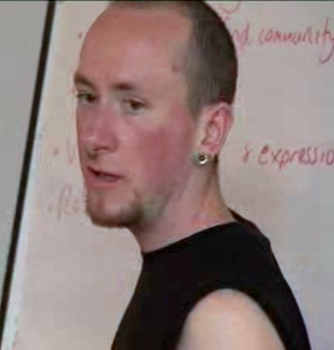
Introduction and moderation: Jay McNeil
Introduction
Since I have been training as a psychologist -I am doing this doctorate that I am about to finish- I've got into a really bad habit of speaking like an academic. So, if I say things that are too complicated or that you don't understand, please stop me and ask me to explain. It's absolutely fine. I'd much rather you work with along what I am saying than sitting and going “what?”.
Minority Stress Hypothesis
I am going to talk about why this particular theory and hypothesis are important. I am going to describe the model that I use, and then I'd like us to have a think about how you might use it in practice as a community, if that feels relevant.
Have any of you heard of the Minority Stress Hypothesis? No? A bit? Okay, I am going to give a quick basic guide. It's sounds like that's probably the right way to pitch it for this room.
Model of trans mental health
I'm going to talk about this one model of trans mental health. And just to be really clear what I mean by a model, it is basically a theory that gathers all the evidence from research and tries to explain something. That's it. It's really, really simple.
So in this case, the Minority Stress Model gathers all the data and evidence about what effects trans people's mental health, and tries to put it into a format to explain why we might struggle psychologically.
What we know, of course, across the borders in all countries, when you look at trans people's mental health and well-being, it's quite a grim picture at times. We are struggling. Our communities are struggling with mental health, and I think this is a quite helpful way at thinking why that might be.
Population level
The point for me, I guess, as a clinician, is it shows me what things I might want to think about when I meet with someone who is trans, in a clinic. It shows me where I might be able to help, as well.
What's really important to remember, is that models are about population level facts. It's not set. There will be some people for whom it doesn't really feel like it fits, but broadly it applies to trans people. It's not about making people fit to a model. It's about giving an overview of what things be the model to think about, might be important.
Explaination
For someone struggling with their mental health, I think this kind of thing is really useful, because it explains why they're struggling. It explains what's happened to them. And I think when we do have mental health difficulties, often we blame ourselves and we feel really bad. And having an explanation can sometimes help take away some of that guild.
Evidence
This is really useful to be able to give to commissioners, and people funding the groups that we might work with, or the services that we might be engaged with, because it highlights all the evidence. Basically, it shows why we're doing what we're doing.
Advocating
And for us, as a community, it helps us to advocate for what we want, because sometimes people don't listen to our voices if we're just talking about what we need. If we can say, there's all this evidence for what we need, then, unfortunately, that goes more.
So, that's the basis of what we're going to talk about.
Mental health
Before I start rambling about it, I just want you to know for me what you think is important for trans people's mental health. What do you think effects our mental health and well-being? Any ideas?
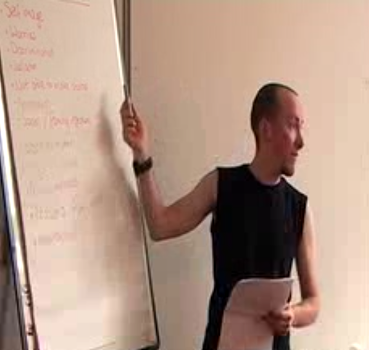 Sheet: Mental health
Sheet: Mental health
- Self-image
- Worries
- Discrimination
- Isolation
- Not able to make your own choices
- Appearance
- Social/family rejection
- Lack of income
- Physical health
- Fear of violence
- Trauma from your past
- Misunderstood
It's quite a list, isn't it? It's quite interesting, because I think with a list like this it always surprises me, actually, how well most of us are, really. Because considering all the different things that we're having to deal with.
It's a lot of stuff, and I always find it quite difficult when I concur to something like this. It provokes something in me that's quite difficult to think about, I'm sure.
General and specific
It does going to fit what I am going to talk about. It fits this model I am going to talk about. And there are some things in here that are quite general, that I think effect everyone in the population. Here: worries, and isolation, and all sorts of things. There are some things that I think are very specific to us as a community.
And that's what we'll talk about next.
Model for LGB
This model, Minority Stress Hypothesis, was first composed by a guy called Meyer in the States. He suggested this model, because he wanted to explain mental health in Lesbian, Gay and Bisexual (LGB) people. What he said, was that LGB people are alienated from social norms around them. And the kind of dominant social and cultural norms that they see around them don't reflect their spirited. That causes a problem, because interaction with the social world is completely inavoidable; we have to interact with people around us. Actually, that is really important for mental health. So, not seeing yourself reflected in the experiences around you is what might have caused it.
Sheet: Minority stressors
- Unique
- Chronic
- Socially based
Minority stressors
Minority stressors are unique. So, they're extra to the general life stress that everyone else has to deal with. They're on top of that. It means that we have to take effort into adapting to that all the time. And this is something that I feel is exhausting, dealing with ingrain transphobia all the time. Because you have to deal with all the every day stressors, and then you have to also manage other people, and all that sort of stuff. It is really tiring.
They're chronic. So, they reflect really stable, underlying, cultural structures, that don't really change very quickly. Things what we expect around gender, stuff like that.
And they're socially based. So, these are social processes, institutions. These are things that are outside of us as indiviuals. It's the world we live in.
Adapted for trans
This model that I am talking about, it's been adapted to the trans community, because trans mental health is a little bit different than LGB mental health.
This is not a complete model of trans mental health. So, like all people, we have got a whole load of stuff to deal with, like anyone. Things like bereavement (when people die, when you're grieving), poverty, loss, all the kind of normal every day stuff that everyone has to deal with.
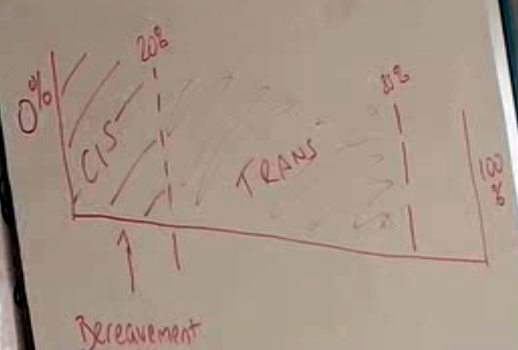
Sheet: Graphic
- 0 – 20%: cis → bereavement, poverty, loss, etc
- 20 – 85%: trans → minority stress hypothesis (msh)
Extra problems
What this model basically says... If you imagine that this [the horizontal line] is mental health. This is how much of the population has poor mental health. 100% [on the right end of the horizontal line], nil % [on the left end of the horizontal line]. Cis people, this is not an exact figure, it's roughly 20%, have mental health issues or underlying problems like that. So, all the reasons for that comes out bereavement, poverty, all the stuff that I was saying about. Trans people is way up here, it's nearsih of 85-ish%. It varies, so don't quote these figures exactly, but it's about this percentage.
Explanation
And what this model tries to do, is explaining all of this extra bit. So, why is it that our mental health is so much worse than this? We have all this stuff. What is it that causes all this extra bit? And that's what I wanted to talk about today.
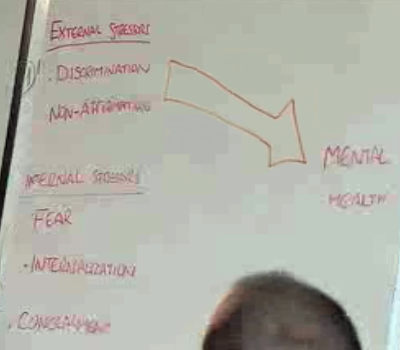 Sheet: Stressors
Sheet: Stressors
- External stressors:
- Discrimination ---------------> Most impact on mental health
- Non-affirmation
- Internal stressors:
- Fear
- Internalisation
- Concealment
Discrimination
When you talk about mental health, there are external stressors and internal stressors. The external stressors are things that happen to us, because we're trans. And the main one is discrimination.
Who hasn't faced discrimination in this room, in some way, shape or form? Does that reflect people's experience? Is that something you come across? A lot? No?
Not yet.
I haven't really experienced over-discrimination. Sometimes some nasty remarks, but no discriminátion. Ja.
Different levels
It's like different levels. Sometimes you see major things and smaller things. I think that's really important. There's the large obvious events, like assault, harrassment, losing your job, and those sort of things. There's also micro-aggressions, those small everyday things that happen. Those little slights that make you feel a little different or a little bit less valued than other people. And that all kind of comes of those external discrimination, use it as a kind of broad lable which means lots of different things.
More than LGB
It's a little bit similar to what you see in lesbian, gay and bisexual people, but it is actually enhanced for a lot of trans people. Because we also have problems accessing documents that reflect who we are, and accessing health care, and feeling save in gendered spaces, and all of those sort of things that might be difficult.
Non-affirmation
There's another one that is external, and that is non-affirmation. What that basically means is not being validated for who we are. So, things like being misgendered, wheather on purpose or not, things like people choosing not to acknowledge who you say you are. Stuff like that.
Fear
Internally, these are basic things that happen when we take in the things from the environment around us. So, I think someone said fear of violence. A lot of times we might fear that we're going to be treated poorly in different situations, and that can have a really big impact on our mental health and well-being. Sometimes that might be people don't go out, or they avoid certain things, or they don't apply for a job that they really want, because they worry they're not going to get it. That sort of thing.
Internalisation
Internalised transphobia, I think this is taking aboard all those negative things that people say about us. Taking inside ourselves and starting to believe it, in some level. And that's kind of making those messages into shame and guild, and all those horrible things that fester inside us, sometimes.
Concealment
And the other one is concealment. That is really complicated for a lot of trans people. Whether or not we conceal our trans identity, or history, or that part of us, it's effected by how we look sometimes. It might be effected by our age, by whether or not we transitioned, if we choose to, and access to medical interventions.
Social gender
Also a lot of cultures rely on gender to basic interactions. So, if that doesn't work for you, because that might out you. And it's effected by believing the legal setting in the culture that you're in. So, you may not have a choice about whether you can conceal things or not. And you may want to or you may not want to. It's difficult, it's a stressor, because you have to hide things, but also sometimes we do it to protect ourselves as well. So, it's quite complicated.
Discrimination biggest stressor
So, there's loads of evidence about how this stuff can meet poor mental health in trans people. All of these different facts have been looked at, and they all do have an impact on our mental health. But the biggest one by far is discrimination. If we get rid of that, we would all be in a much better place by large. I can't stress how much that effects us.
Strengthening
That's not news really, is it. What I am interested in though, is what can get in the way of this. And how can we stop this from happening. All these things, having an impact on us. So, what I am interested in is things that make us stronger.
Has anyone got any thoughts about what could take the impact of this? What things might make us some stronger, as a community and as inividuals? So, if all of these things can give us quite poor mental health, what could stop that happening? Any ideas?
Connection with community
Environment
Support
Activism
Because activism creates a circle, so it creates community, which can support your internal and external stressors. Somehow it creates community, so it can protect you and it can support you, both as a person, and also in spaces and in different situations. But also it's a circle, so the more people are struggling against discrimination, the more visibility, ideally.
What for me helps, my motto is: I am transgender and I am proud. I really believe that, every day. When I walk the streets, I am transgender and proud. I don't make myself small. When I am at work, I am there and I show myself, and I am proud of the person I am. Maybe that is one of the reasons why I don't experience discrimination so far, because I am there, I am strong, I stand there and I don't allow you to hurt me. And that's my motto every day, and I think I oose it with every pore of my body, that's my motto.
That's cool.
You are proud of what you are.
That is self-acceptance.
Self-confidence can prevent people from trying to take the power from you.
The way you were telling about all the the harm that is been done, I think the most painful thing is that a lot of it is the harm done to yourself by yourself. And for me it feels sometimes you're like an animal that isn't treated right, like a parrot, and then at a certain point he starts biting himself and plucking his own feathers. That's something you're doing yourself. I think a lot of the things that are there, you can do yourself. So, stop biting yourself.
And make yourself independent from the judgement by other people. I think that helps a lot. If another person is discriminating you or struggling with whether he has to say “he” or “she”, that's his problem. That is not your problem.
Feel that fear. If you let yourself be afraid, you'll learn how to deal with it, and that's much more helping than fighting fear.
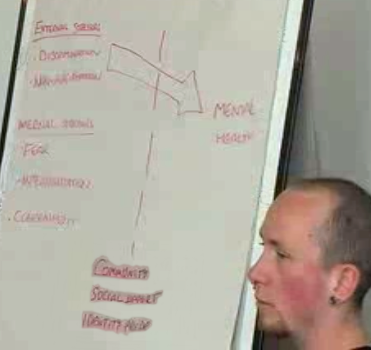 Sheet: Stressors
Sheet: Stressors
- External stressors: |
- Discrimination ------|---------> Most impact on mental health
- Non-affirmation |
- Internal stressors: |
- Fear |
- Internalisation |
- Concealment |
- Community
- Social support
- Identity pride
Model
A lot of the things you've said are things that are in here. So, the things that we find in this model are: community membership, social support -this is all sounding familiar, isn't it?- and identity pride.
Community
Those things seemed to be really, really key. When researchers were looking what prevent all this stuff from getting to us, these things seem to be the main thing. And the most important thing has been showed to feel part of a community, really. That does lots of things. There is a lot of reasons for that.
Support
If we are experiencing discrimination, or we're being awkwarded, or feeling different, we can talk to other people who have experienced certain things, we can learn what other people do, think, find out what other people do to cope. We can talk to people who knows how that actually feels like, who understand how that effects us. So, we can get emotional support and practical support.
Solidarity
When we gather around by identity as trans people, we can access solidarity and that's really protecting. It also means that we can develop a more positive identity as trans people. Everyone compares themselve to other people, all the time. And when we are comparing to cis people, the wider cis community, we're like the outgroup, we're a bit different. And sometimes we can really feel that. When we're in a group with other people that are like us in whatever way, and in this case I'm talking about trans stuff, we're the ingroup suddenly. And we're looking at other people who are like us, and they're not that different. And you can have a ingroup identity, and that is actually really important. That is really good for challenging that internalised transphobia.
Celebrating
We get to celebrate our achievements and feel pride in ourselves, when we can see other trans people just generally being awesome, and just getting on doing our awesome stuff that you might be doing.
Benefit, or not
It's important to remember, though, that trans people are most able to access the benefits from being part of our community, when they're out and open, and living that life.
So, for some people, at different times or maybe permanently, it might be harmful to access that, if they're not able to be out or don't feel empowered to do that, or have fears around connecting the trans community. And this is worth bearing that in mind: this is a broad model, but there will be some people it doesn't necessarily work for that well.
Targeting efforts
For me as a clinician and an activist, this tells me that there's lots that I can do. And it shows me where I can target my efforts, so that I can have an impact.
Discussion
So, before I talk about what I think are the key messages to take from this, I'd just really like to have a little bit of discussion with you all. Maybe we just have a wider conversation.
Is having a framework helpful, to think that: 1. mental health, 2. the things that effect us, 3. what's protective? How am I able to use a model like that? Or is it actually meanless, does it not make sense to you? I just really like to hear your thoughts, to be honest. Any ideas?
I think it's eligable, because usually when we talk about psychological support, it's very individualised. But in this case this model also addresses a social issue, which has to be changed. So it's not just us in the middle, but there is also society. And so, we are effected by it, but we can also effect society.
I think that what you've said is exactly true, that there's often a habit of presenting being transgender as being inherently the problem. And some people do experience things that come from within that are negative, but that's not necessarily some thing. I think realising that a lot of the problem is society, and that a lot of what we are experiencing isn't coming from the fact that you're transgender, but from the fact that society is transphobic, itself helps improvement of mental health.
I like how it helps at least me to relate to the problems of other minorities. Just feel things in common with them. Because there might be a whole different why they are minority, maybe just a kind of -I don't know- colour of skin, or so, but still we have a lot in common.
I think what's quite interesting about it is that there's these processes. But I think there's some things about that which are very specific to us, but actually a lot of that is applicable to anyone who feels different, who is treated differently by the world around them. Definitely.
To be in an ablebodied society as a trans guy and somebody with an visible disability is being a double minority.
Changing policies and programmes to support the community.
I can see it being problematic for some people. I mean, sense of community has to be a possibility for someone to gain something by. A lot of trans people have low energy, especially at a certain point in the transition. So, I can imagine that for a lot of people who can't find the community, who feel it's too far away, I don't think the model is relevant. Maybe.
Is there any relevance for clinics or clinicians that might work with us? If you go to clinics, to maybe look at this kind of stuff, these are the different factors? Do you think it would be helpful? Or would you rather just focus on transition related things?
Yes, I think it will be definitely be helpful if care providers and community cooperate more.
I'm working at a place in a gender clinic in Manchester in the UK and I'm going to train them in this model. Because I think it might be a good way of getting shared language around all the different things that effect us. It's not all about the medical stuff. Actually, it is a whole other load of stuff that some people might want support with, or some help with.
Can I say something I sort of didn't like? But that could be maybe integrate with something, because it feels that there is this transition, then there is racism, homophobia, class, there are all sorts of separate groups, but I think they're all integrated. And they work very differently for every person and in different contents. So, for instance in the introduction, when you said poverty effects everyone, that's true, probably class effects everyone, but poverty probably doesn't effect everyone in the same way. And so, I think that is something that should be reflected upon. How to integrate that more? How to take that into account?
So, intersectionality. That's a really good point. I was thinking about this before I started this, and I think, for me, there are some things which are similar that anyone who feels socially oppressed. So, some of those processes will feel similar. And then there are extra ones that are relevant to those, and that's kind of based on identity. So, some will be around being trans, having a trans identity, and those are the ones that I'm looking at now. Some will maybe be around having a disability or something like that. So, having a disabled idenitity. But that doesn't bring it all together in a unique way that makes sense.
Okay, just for me as a clinician it's all shades of one-to-one work where you want to be so effective, because that's only going to work on a few other things that lead to mental...
May I add one word? I think also something like visibility. Create visibility and it doesn't need...
Rolemodels!
Yeah, rolemodels, but it doesn't necessarily have to be a rolemodel, but also something like art, or just show yourself. It doesn't really need to be a rolemodel, but it can also be by art or by music. And then it's not about being a trans musician, but also expressing the transgender identity by art. It can be a painting, a song, a book or a movie. So people can see what it is and start thinking about it, in stead of just deny it. Expression.
Good. You could reach people who aren't connecting to the community, who might be in stealth, because that shows them to be, who might not feel part of a trans world, but that through art tries to reach them, kind of provide some visibility, that's kind of cool and that's a positive sign.
Sheet: What next?
- Address social issue
- Not inherently a problem
- Closer to other minorities
- Changing policy
- What if can't find a community
- Intersectionality
- Visibility: art and expression
- Role-models
Useful tool
I just want to give you a brief overview. I think it's helpful, because it means that we apply for funding for some groups that I run I can evidence what I'm talking about and show why I think it'll still work and I think it's quite a useful tool. And I think it could be quite easily for clinicians, for us to tell clinicians to come and get them to think about other things.
Key messages
I've got three key messages that I like you to take away from this.
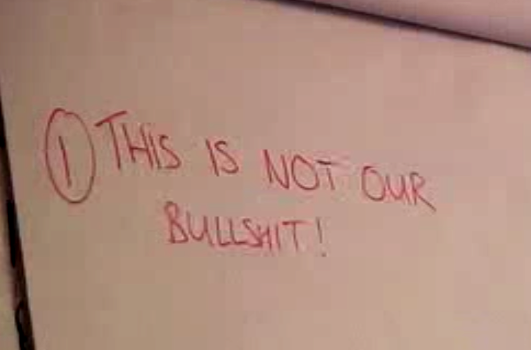
Sheet: Conclusions
- This is not our bullshit!
- Super-inclusive space
- Celebrate our awesomeness
Not our bullshit!
This is my main one: This is not our bullshit! This is absolutely my main one, above everything else [laughs]. Our mental health is overwhelmingly effected by other people, basically. If that changes, I am pretty sure we'ld be much closer to the rest of the population on that scale of where our mental health is so far at the moment. I think we would be so much closer. We have to put the owners of responsibility firmly back on those who are doing the discriminating, who are saying we aren't valued. This is not our bullshit! That's my main point.
Personal example
So, we can do that lots of ways. I just want to give a really brief example of how I am going to do that. I am a researcher as well as a clinician, as I said. And I have been guilty of making trans mental health a trans problem over the years, as well.
Back in 2012 we needed to do the trans mental health study to get information to argue of policy change in the UK. But I've also done trans mental health research more recently, and what I am starting to feel like I'm doing implicitly when I'm doing mental health research just with trans people, is I am saying: “This is your problem, and it's your responsibility.” When all the evidence really shows that it's kind of not.
Discriminators
We've got a really good understanding of trans mental health now. We know what factors effects us. This is à model of it, but we know. Everyone knows that. So, if we're going to make a difference, which is obviously the next step. There's no point in having research and it doesn't change anything. You know who we need to research? It's actually the people who are doing the discriminating, because it's them who has the problem. This isn't our shoes. If we want to change mental health, we need to put the focus back on to the people who are actually doing that in the first place. And make it their problem.
Ask researchers
Never take part in research about trans mental health as a trans person, if you get a request to take part in a research. But drill the person doing it about why they're doing it. It's got to have a good reason, a good rationale. And that reason has to come from us as a community, and not from the clinics who want to study you, basically. So, if you get a request, interrogate the person. Ask them how it is going to make a difference to you. For me, that's one way of putting responsibility back on the people where it should be.
Inclusive spaces
The next one for me is: make our spaces super-inclusive, above all else. For people to benefit from community spaces, they need to feel part of the community, strangely enough. And this is harder for people who have multiple marginalised identities. If our trans spaces support only one type of trans person, if they only support, for example, white or binary trans people, they will not be protective for people who don't fit those norms. We can change this. And part of it is listening to a wider communities and recognising what we can do differently.
Celebrate
And finally, my favorite: celebrate our awesomeness! Foster pride in our identities, because I think we are quite amazing, by large. We need to move forward, with all the things we also gain and develop, because we're trans people. It's not actually all bad, although I know I talked about all this negative stuff, that impacts us. But there's a whole load of stuff that is absolutely brilliant as well. That we can totally celebrate about ourselves and about our communities.
Negative and positive
We focus so much on the negative messages, things that are in the media. Especially when terrible things are happening to people like us in the world, which we have seen at the moment, all of the time. Things like TdoR, Trans Day of Remembrance, totally have a purpose, absolutely.
But think about the ways I've done research in the past, it also reinforces there is a struggle and it's difficult being trans, it can be really hard. It's not say it's not, it is and sometimes it can be really awful. But sometimes it's absolutely amazing. Sometimes I could not be more proud of who I am, and we need to make spaces to celebrate ourselves.
So, those are my three take-home messages, which I hope you can get on board. Thank you very much.
